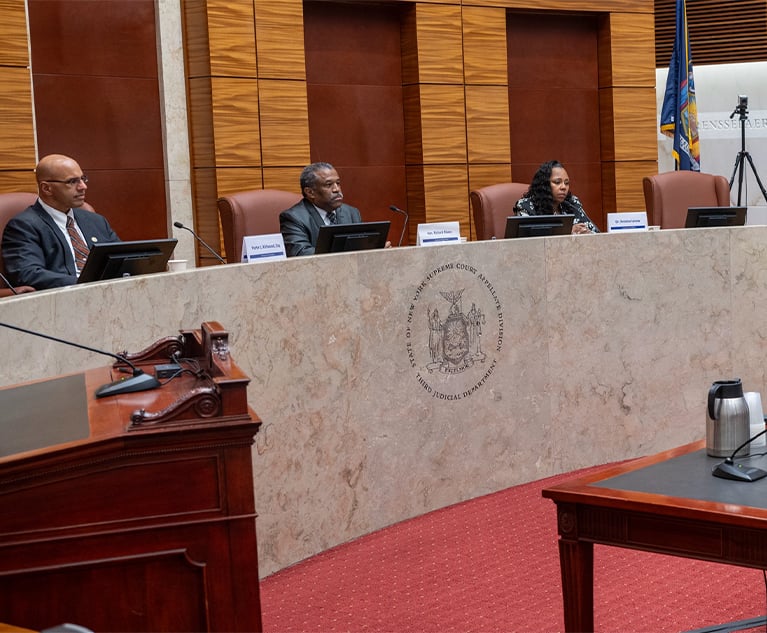Coercion Boundary Pushed in Bond Fraud Case
Orrick's Gregory Morvillo, in motion papers and before the court, argued that's the very kind of misconduct assistant U.S. attorneys committed against his client.
March 06, 2018 at 10:08 PM
6 minute read

Coercion is easy enough to point to when it's physical—but can you prove it when it's psychological?
Orrick, Herrington & Sutcliffe partner Gregory Morvillo felt he had a good case to make.
Appearing before Judge Ronnie Abrams of the U.S. District Court for the Southern District of New York, Morvillo argued passionately that his client Michelle Morton suffered from psychological coercion at the hands of assistant U.S attorneys in the Manhattan office.
Morton, along with five co-defendants, is allegedly part of a fraudulent financial conspiracy with Jason Galanis, who has pleaded guilty in the case—his second fraud plea in as many years.
In 2016, Galanis pleaded guilty to securities fraud-related charges after secretly gaining control of a publicly-traded reinsurance business that he then, along with conspirators, manipulated the stock price of to defraud investors of as much as $60 million—all despite being under a ban by the Securities and Exchange Commission.
In the current case, prosecutors say the group, which range from Galanis' father to Morton, conspired to defraud investors and a Native American tribal entity of tens of millions of dollars.
In a motion to dismiss the indictment against her, Morton's legal team argued that she was little more than a pawn in Galanis' game. It was through the socially responsible investment firm Morton created that the allegedly fraudulent bonds issued by an Oglala Sioux Native American tribal entity being pushed by Galanis were first bought.
According to the motion, Morton, who is neither a lawyer nor an experienced financier, believed the bonds were a sound, prudent investment. It was only later, after more bonds were purchased as part of the acquisition of another financial firm, that questions about the questionable nature of the bonds were first raised.
Galanis would later plead guilty to his role in getting the tribal group to issue $63 million in bonds, from which he and the alleged co-conspirators worked together to help siphon off millions into accounts controlled by alleged Galanis associates.
Morton claims that, after she realized the bonds may not have been handled in a good-faith way, she went to a friend at the Financial Industry Regulatory Authority to find out who she should talk to.
It was at this point, Morvillo told Abrams on Tuesday during a hearing on the motion, that federal authorities began egregiously taking advantage of his client.
Morton was passed from the SEC to the FBI, where she was brought into contact with so-far unnamed assistant U.S. attorneys. According to her motion, Morton, who offered to provide whatever help she could, was under the illusion that she and the prosecutors were on the same side. The reality couldn't have been further from the truth.
During her first meeting, she was told she could have a lawyer, Morvillo told the court. But when she asked why she would need one, considering that she'd done nothing wrong, “she was met with silence.”
“They absolutely duped her into cooperating,” an impassioned Morvillo stated.
Prosecutors would, according to Morvillo, proceed to take great liberties with Morton, who he said believed she was simply doing the right thing. She allowed them access to her phone, providing a trove of texts between her and Galanis. She willingly allowed calls with Galanis to be recorded. She even went so far as to wear a wire to meetings with defendants—meetings Morvillo stated were the very interactions the government referenced in the charges against her.
Not once, Morvillo said, did prosecutors alert her to the fact that she faced criminal exposure. At one point she was told she was a subject in the investigation, but authorities downplayed the implication, saying most people fell into that category and that she was far closer to witness status, according to her attorney.
At one point the line assistants went so far as to give her legal advice, after she asked what she should do about the bonds, according to Morvillo. The prosecutors told her not to try and unload them “because she could be perpetuating a fraud.” It was, she claims, the first time she realized the bonds themselves were potentially toxic, not just Galanis.
The government offered her no proffer, failed to alert her that she needed an attorney and continued to “mislead her, pretending she was on Team America,” Morvillo told the court. Judge Abrams then asked where in the law such tactics were forbidden.
Morvillo acknowledged that the case law surrounding allegations of coercion clearly focused on the physical kind but argued there was a cultural “paradigm” shift in understanding that both psychological and physical coercion can occur. As proof, he pointed to the awareness growing out of the #MeToo movement and the uproar over revelations that President Donald Trump's chief of staff discounted abuse allegations against an aide because the claims were of “emotional abuse.”
Assistant U.S. Attorney Rebecca Mermelstein, who is on the team handling the case for the government, provided a spirited defense for her colleagues. She doubted that what was allegedly said by the prosecutors, as presented by Morvillo, was in fact how things occurred but that the intent certainly was not to dupe the defendant.
“That's just not what happened,” she said.
Movillo noted in response that the government previously had the opportunity to provide affidavits as to what occurred but did not.
“They had their chance, and they blew it,” he said.
Ultimately, Abrams found there simply is no basis in the law to dismiss the indictment, as the actions by the government “did not arise to the level of misconduct” necessary for the admittedly harsh action. She would also go on to deny a request to suppress evidence against Morton gathered while she was helping prosecutors. A decision on severing Morton and other defendants' cases was reserved by Abrams.
The trial for the five remaining defendants is set to begin April 30.
This content has been archived. It is available through our partners, LexisNexis® and Bloomberg Law.
To view this content, please continue to their sites.
Not a Lexis Subscriber?
Subscribe Now
Not a Bloomberg Law Subscriber?
Subscribe Now
NOT FOR REPRINT
© 2025 ALM Global, LLC, All Rights Reserved. Request academic re-use from www.copyright.com. All other uses, submit a request to [email protected]. For more information visit Asset & Logo Licensing.
You Might Like
View All

Law Firms Expand Scope of Immigration Expertise Amid Blitz of Trump Orders
6 minute read
'Reluctant to Trust'?: NY Courts Continue to Grapple With Complexities of Jury Diversity
Trending Stories
- 1Uber Files RICO Suit Against Plaintiff-Side Firms Alleging Fraudulent Injury Claims
- 2The Law Firm Disrupted: Scrutinizing the Elephant More Than the Mouse
- 3Inherent Diminished Value Damages Unavailable to 3rd-Party Claimants, Court Says
- 4Pa. Defense Firm Sued by Client Over Ex-Eagles Player's $43.5M Med Mal Win
- 5Losses Mount at Morris Manning, but Departing Ex-Chair Stays Bullish About His Old Firm's Future
Who Got The Work
J. Brugh Lower of Gibbons has entered an appearance for industrial equipment supplier Devco Corporation in a pending trademark infringement lawsuit. The suit, accusing the defendant of selling knock-off Graco products, was filed Dec. 18 in New Jersey District Court by Rivkin Radler on behalf of Graco Inc. and Graco Minnesota. The case, assigned to U.S. District Judge Zahid N. Quraishi, is 3:24-cv-11294, Graco Inc. et al v. Devco Corporation.
Who Got The Work
Rebecca Maller-Stein and Kent A. Yalowitz of Arnold & Porter Kaye Scholer have entered their appearances for Hanaco Venture Capital and its executives, Lior Prosor and David Frankel, in a pending securities lawsuit. The action, filed on Dec. 24 in New York Southern District Court by Zell, Aron & Co. on behalf of Goldeneye Advisors, accuses the defendants of negligently and fraudulently managing the plaintiff's $1 million investment. The case, assigned to U.S. District Judge Vernon S. Broderick, is 1:24-cv-09918, Goldeneye Advisors, LLC v. Hanaco Venture Capital, Ltd. et al.
Who Got The Work
Attorneys from A&O Shearman has stepped in as defense counsel for Toronto-Dominion Bank and other defendants in a pending securities class action. The suit, filed Dec. 11 in New York Southern District Court by Bleichmar Fonti & Auld, accuses the defendants of concealing the bank's 'pervasive' deficiencies in regards to its compliance with the Bank Secrecy Act and the quality of its anti-money laundering controls. The case, assigned to U.S. District Judge Arun Subramanian, is 1:24-cv-09445, Gonzalez v. The Toronto-Dominion Bank et al.
Who Got The Work
Crown Castle International, a Pennsylvania company providing shared communications infrastructure, has turned to Luke D. Wolf of Gordon Rees Scully Mansukhani to fend off a pending breach-of-contract lawsuit. The court action, filed Nov. 25 in Michigan Eastern District Court by Hooper Hathaway PC on behalf of The Town Residences LLC, accuses Crown Castle of failing to transfer approximately $30,000 in utility payments from T-Mobile in breach of a roof-top lease and assignment agreement. The case, assigned to U.S. District Judge Susan K. Declercq, is 2:24-cv-13131, The Town Residences LLC v. T-Mobile US, Inc. et al.
Who Got The Work
Wilfred P. Coronato and Daniel M. Schwartz of McCarter & English have stepped in as defense counsel to Electrolux Home Products Inc. in a pending product liability lawsuit. The court action, filed Nov. 26 in New York Eastern District Court by Poulos Lopiccolo PC and Nagel Rice LLP on behalf of David Stern, alleges that the defendant's refrigerators’ drawers and shelving repeatedly break and fall apart within months after purchase. The case, assigned to U.S. District Judge Joan M. Azrack, is 2:24-cv-08204, Stern v. Electrolux Home Products, Inc.
Featured Firms
Law Offices of Gary Martin Hays & Associates, P.C.
(470) 294-1674
Law Offices of Mark E. Salomone
(857) 444-6468
Smith & Hassler
(713) 739-1250







